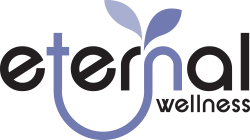It’s a fact we can’t ignore: we live in a toxic world. In response to this, you have probably also heard about the importance of detoxing your body. You may have even tried cleanses for specific organs such as the gut, liver, or kidneys.
But did you know that there are certain nutrients that can “work their magic” by gently helping the body to detoxify on a daily basis? Iodine is at the top of this list of important minerals which can heal as well as cleanse.
3 Critical Ways that Iodine Can Help You Detox
#1 – Iodine Can Help Your Body Detox from “Halides” (Fluoride, Bromide & Chlorine)
Let’s get specific when it comes to the toxins that are impacting your health and the health of your loved ones. Many of the dangerous chemicals we take in from the air, water, soil, and food supply are called “endocrine disruptors.”
These endocrine disruptors include bromide, chlorine, fluoride, and their derivatives, such as perchlorate (found in jet fuel), which has a chloride component.
Conditions associated with high amounts of halides in the body include:
- ovarian cysts
- uterine fibroids2
- fibrocystic breast disease
- cancers of the uterus, ovaries, breasts, and prostate3
Endocrine disruptors like bromide4 do their damage by crowding out iodine in cellular receptor sites throughout the entire body. However, these three areas – thyroid, breasts, ovaries – are where concentrations of iodine are stored and utilized the most. Likewise, they are also the places where halides like to “hang out” most.
This is a big reason why getting enough absorbable iodine into your system every day is so important. Dangerous halides are in just about everything from drinking water to pesticides, and are also in the same category as iodine on the periodic table. This means that while halides can crowd out iodine, sufficient amounts of the right kind of iodine can gently and slowly crowd out halides as well.5
Of equal concern in our toxic world are endocrine disruptors that can come in the form of “xenoestrogens” which mimic aggressive forms of natural estrogen. Like halides, xenoestrogens such as Bisphenol A replace milder forms of estrogen in the body and are increasingly connected to breast cancer, according to a 2010 report published in the journal Hormones and Cancer, 6 among others. Iodine, on the other hand, can help flush out chemically-derived xenoestrogens.
#2 – Iodine May Chelate Some Heavy Metals Like Mercury
Iodine supplementation may help you detox from heavy metals like lead, mercury, cadmium, and aluminum. Dr. David Brownstein, author of the book Iodine: Why You Need It / Why You Can’t Live Without It and an expert in iodine, states that “Iodine is a chelator of mercury. It will bind with mercury and allow the body to release [it].”7
There is also some evidence that high levels of iodine can bind to aluminum, removing it from the body, albeit at a slower rate. Dr. West cites one study where the “results obtained following iodine supplementation revealed that in some subjects, the urine levels of mercury, lead, and cadmium increased by several-fold after just one day of supplementation. For aluminum, this increased excretion was not observed usually until after one month or more on the iodine supplementation.”
To date, studies that have been done on iodine’s chelation abilities are few and far between. It is clear from anecdotal evidence, however, that there is very likely a connection.
#3 – Iodine Boosts Your Liver and Kidneys Naturally
The major detoxification pathways of the body include the liver, the kidneys, the lymph system, and the skin. And guess what? Iodine is a major player in helping each one of these organ systems function at its best. Here’s how:
The Lymph System: Iodine deficiency is a common cause of lymphatic congestion, according to Dr. John Douillard, a global leader in the field of health and Ayurveda.9
The Liver: The thyroid and the liver are intricately connected, and iodine is a key for communication between them. The metabolic thyroid hormone thyroxine (T3) is comprised of 3 iodine molecules and is inactive when it is produced by the thyroid. It must travel to the liver to be converted to its active form, tri‐iodothyronine (T4). When any of the components of this delicate process are off, the whole mechanism suffers, and so does your vital energy and overall health!
The Kidneys: As with the liver, there is a delicate relationship between thyroid function and the kidneys, in large part mediated by iodine. Several studies have established the link between kidney disease and thyroid malfunction.
Chronic kidney disease (CKD) is often characterized by low T3 production. Hypothyroidism is also very common amongst CKD patients, according to a 2012 study published in the Indian Journal of Endocrinology and Metabolism.11
The Skin: Did you know that iodine is a natural antiseptic? In fact, in the 1800s iodine was regularly carried in vials around the neck and used to treat mosquito bites for the prevention of disease. Iodine can be useful in fighting infection and can be used as a wound cleaner. And it’s great for wrinkles on the skin as well!
How to Help Your Body Detox With Iodine
One of the best way to get rid of toxins and help your own natural detoxification pathways is to add iodine to your diet every day. Including more iodine-rich foods to your plate is one good way.
Here are some foods that contain fairly high amounts of iodine:
- Seaweeds, such as dulce and kelp
- Berries, such as strawberries and cranberries
- Seafood and fish
- Dark leafy green vegetables
- Dairy products, like eggs and cheese
For some, if not most individuals, getting enough iodine from food alone may not be enough. The World Health Organization states that approximately 2 billion people worldwide have some form of iodine deficiency.


